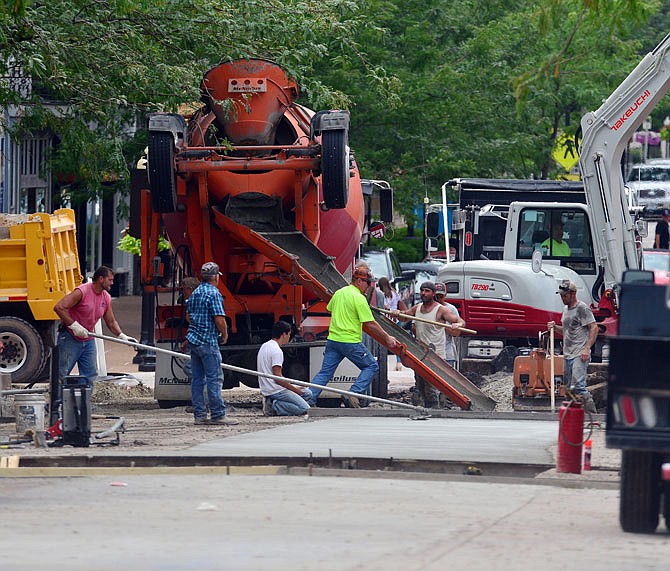Jefferson City and Cole County officials said any savings they incur from a partial repeal to the state's prevailing wage law likely will be negligible.
Gov. Mike Parson signed House Bill 1729 on July 13, rolling back several provisions of the state's long-standing prevailing wage law. The changes will take effect Aug. 28.
Most notably, the bill eliminates prevailing wage requirements for projects costing more than $75,000.
Jefferson City Public Works Director Matt Morasch and Cole County Public Works Director Larry Benz said most city and county construction projects cost more than that threshold.
Many city projects, like Jefferson City's plans to resurface about 60 roads between 2018-20, cost at least $1 million, Morasch said.
"At the city, we do very few that are under $75,000," Morasch said.
Benz said even simple projects like curb replacements can cost about $100,000. He estimated fewer than 10 percent of Cole County projects cost less than $75,000.
"It may affect some of the smaller (projects)," Benz said, "(like) drop inlets, but most of the time we do that work ourselves."
Missouri's prevailing wage law dates back to 1959, and is similar to the federal Davis-Bacon Act of 1931, which requires workers be paid minimum wages on federal construction projects.
Under existing law, the state compares the number of hours worked in each county at the collectively bargained rate and the rate non-union contractors pay. The rate with the most hours worked each year prevails and becomes the prevailing wage for each skill set and occupation in each county.
Under the new law, at least 1,000 hours of work in a given county and job category must be reported to the state for the previous year for the prevailing wage rate to apply. If that does not happen, a contracting minimum wage defined as 120 percent of a county's average wage will be paid to construction workers.
HB 1729 also exempts all public works projects costing less than $10,000 from competitive bid requirements. This provision and the $75,000 threshold appear to attempt to distinguish between construction projects and maintenance projects.
Susan Goldammer, senior director of employment and labor relations for the Missouri Schools Boards Association, told Bloomberg BNA in May the association supported the bill because it could help schools avoid paying prevailing wage rates for routine maintenance.
Morasch and Benz said larger construction projects often enjoy better economies of scale, which ultimately make the cost of materials and insurance cheaper than on small projects.
"Occasionally, we'll have a small project, but you gain some economies of scale by having your jobs of a certain size," Morasch said.
Morasch and Benz said materials and equipment make up the majority of costs on most jobs, and only a fraction goes to labor. The new law allows counties to elect to reduce labor costs by allowing employers to use entry-level and federally registered apprentices for up to half of the wage rate on construction jobs.
IBEW Local 257 President Joel Vanderslice said he worries this provision could lead to low-quality work for entities that elect to exercise that provision.
"I don't know that you'll see the effects if there's quality craftsmanship or not for two or three years," Vanderslice said.
In the end, Benz and Morasch said, it will be hard to quantify whether Jefferson City or Cole County will see savings.
"It has the potential to," Benz said. "Whether or not is still to be determined."

